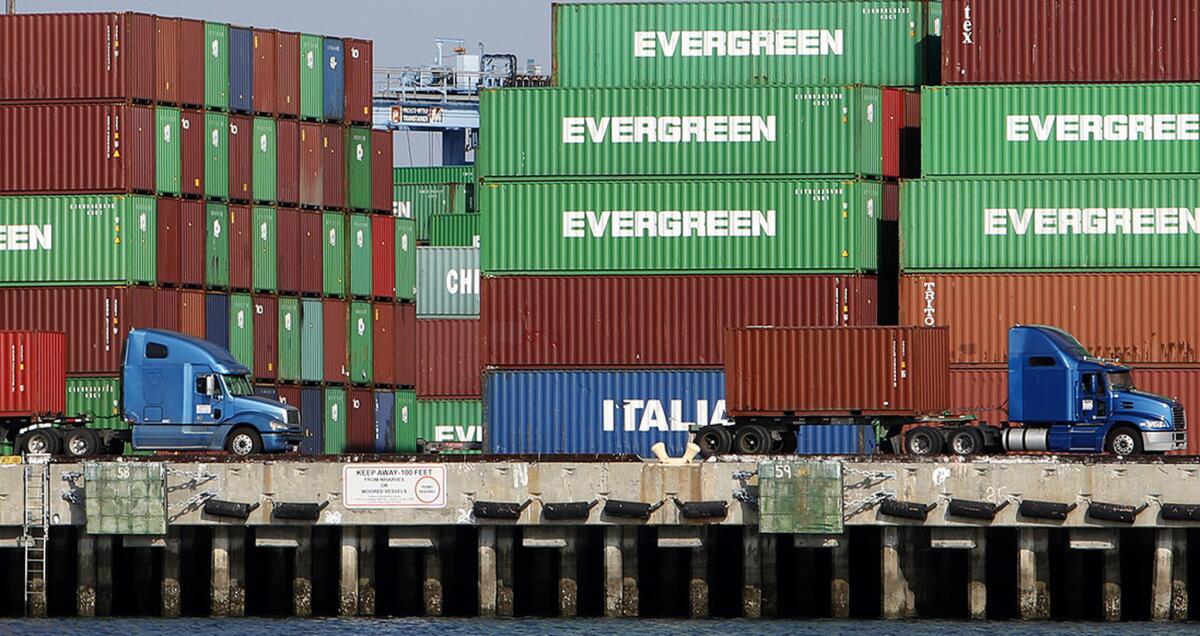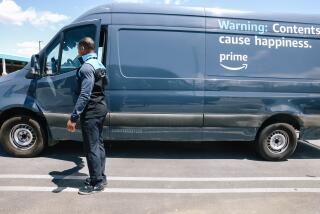Port drivers win millions in back pay from trucking firm

Disputes between trucking companies and port truck drivers have become common in recent years, but typically state labor regulators handle worker classification complaints individually or in small groups. Above, cargo trucks in San Pedro.
A port trucking firm in Carson has been ordered to turn over nearly $7 million in back pay to 38 drivers, the latest in a series of recent wins for port drivers and the Teamsters union that has been trying to organize them.
The state Labor Commissioner’s Office ruled this month that the drivers at Pacific 9 Transportation were improperly treated as independent contractors rather than as employees. It ordered the company to compensate drivers for illegal paycheck deductions, back wages and legal costs, payouts that amount to hundreds of thousands of dollars for some.
Though the decision, disclosed Tuesday, affects just a fraction of the nearly 12,000 drivers who haul cargo at the local ports, the order shows that labor organizers are having some success in using employee classification claims to push trucking firms to treat drivers as employees — who, unlike contractors, are allowed to unionize.
Join the conversation on Facebook >>
Disputes between trucking companies and port truck drivers have become common in recent years, but typically state labor regulators handle classification complaints individually or in small groups. But the recent case involving Pacific 9 — as well as two others involving trucking firms — was heard en masse, with the Labor Commissioner’s Office ruling in favor of dozens of drivers at once.
“This is not an everyday kind of decision,” said Robert Millman, a partner in the Century City office of labor and employment law firm Littler Mendelson, who was not involved in the case. “It’s apparent that the Teamsters have glommed onto this issue as an organizing tool.”
These larger actions could spark an acceleration in the number of claims against trucking firms at the ports of Los Angeles and Long Beach, most of which say their workers are independent contractors, according to labor organizers.
“There are hundreds of trucking companies at the ports, and the vast majority are misclassifying drivers,” said Julie Gutman Dickinson, an attorney who has represented the Teamsters union and is on the advisory board of the Los Angeles Alliance for a New Economy, a labor-backed advocacy group that represented drivers in the Pacific 9 case.
Labor Commissioner Julie Su said 720 truck drivers have filed complaints with her office since 2012. The office has ruled in three cases affecting more than 100 drivers since July.
“In this industry, we have found misclassification routinely in the case we’ve heard,” she said.
Details about the other two cases were not immediately available.
In its Pacific 9 ruling, the commission said independent contractor agreements signed by drivers “often amount to a subterfuge to avoid paying payroll taxes, income taxes and workers’ compensation liability.”
Company executives did not return calls for comment. But the trade group Harbor Trucking Assn. lashed out at state regulators, saying more than 90% of the labor commission’s decisions favor workers over employers, a figure that shows partiality.
“This means the labor commissioner is driving drivers into employee status, which means loss of freedom and control over working hours, schedule, whether to work or not, and assets and equity such as a $100,000 truck and lucrative contractual relationships with trucking companies,” the association said in a statement.
The trade group, in a nod to Uber and Lyft, also said Su’s office has “lost touch” with how technology and entrepreneurs have “revolutionized ... driver and trucking company relations,” moving them toward independent contractors and away from traditional employee status.
SIGN UP for the free California Inc. business newsletter >>
However, Uber and Lyft have become the subjects of labor disputes too. The Seattle City Council this month voted to allow drivers for those and other ride-sharing companies to form a union, and Uber is facing a class-action lawsuit from drivers who say they want to be recognized as employees.
Trucking companies also operate differently from the new ride-sharing services.
Ride-sharing drivers must have a car of their own, but port truckers often lease their rigs from a trucking firm. Those lease agreements sometimes prohibit drivers from using the truck to work for another company. Uber and Lyft drivers, meanwhile, often drive for both companies
Former Pacific 9 driver Daniel Linares, one of the 38 Pacific 9 drivers, said the company fired him in April. But when he drove for the company, he said he didn’t feel like an independent contractor.
“The control is on the company side only,” said Linares, 60. “The drivers don’t control anything. They tell us which loads to pick up and where to drop them and what to do next once we’re done.”
The bulk of the payouts ordered by the commission relate to Pacific 9 deductions from drivers’ paychecks to cover truck lease payments, insurance, maintenance and other costs. In many cases, such deductions added up to hundreds of thousands of dollars over several years. The commission ordered smaller payouts for a number of other violations and to cover drivers’ legal expenses.
The commission also found that drivers sometimes earned less than the minimum wage and ordered Pacific 9 to pay back wages to cover the shortfall, amounting to a few thousand dollars for most drivers.
The company must repay drivers for work-related expenses, such as truck maintenance costs, sometimes amounting to thousands of dollars. The commission further found drivers were not paid for rest and meal breaks and ordered payouts to cover that time.
For all payouts, the commission ordered Pacific 9 to pay interest dating back to when wages or payments were initially due. In some cases, those interest payments amount to tens of thousands of dollars.
In total, the commission ordered payments to 37 of the 38 drivers, with the average driver set to receive more than $187,000. The lone driver not paid was found to have claims that were too old and outside the statute of limitations.
Pacific 9 can appeal the commission’s order. If it does, the company will have to post a bond for the amount of the payouts to drivers, Labor Commissioner Su said.
Twitter: @jrkoren
MORE BUSINESS COVERAGE
SpaceX landing hailed as giant leap for space travel
China’s economy: Seven predictions for 2016
With no ‘Star Wars’ in theaters, Chinese moviegoers flock to ‘Mojin’
More to Read
Inside the business of entertainment
The Wide Shot brings you news, analysis and insights on everything from streaming wars to production — and what it all means for the future.
You may occasionally receive promotional content from the Los Angeles Times.











